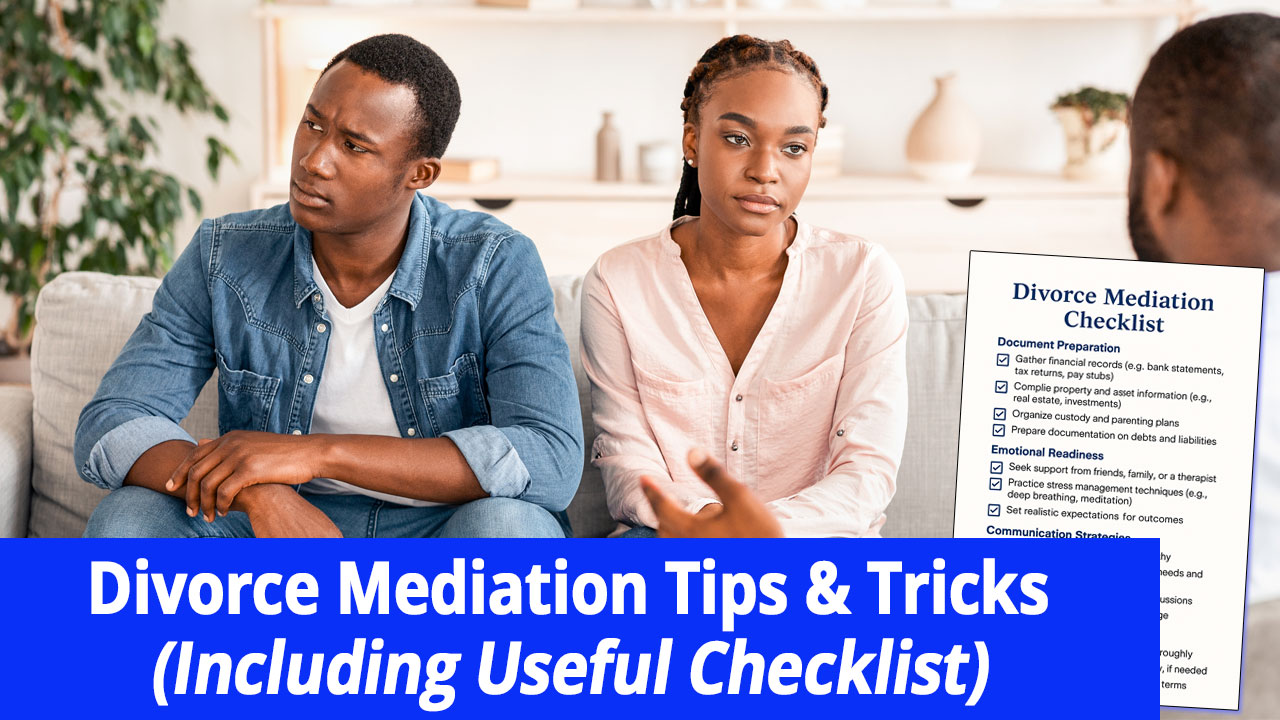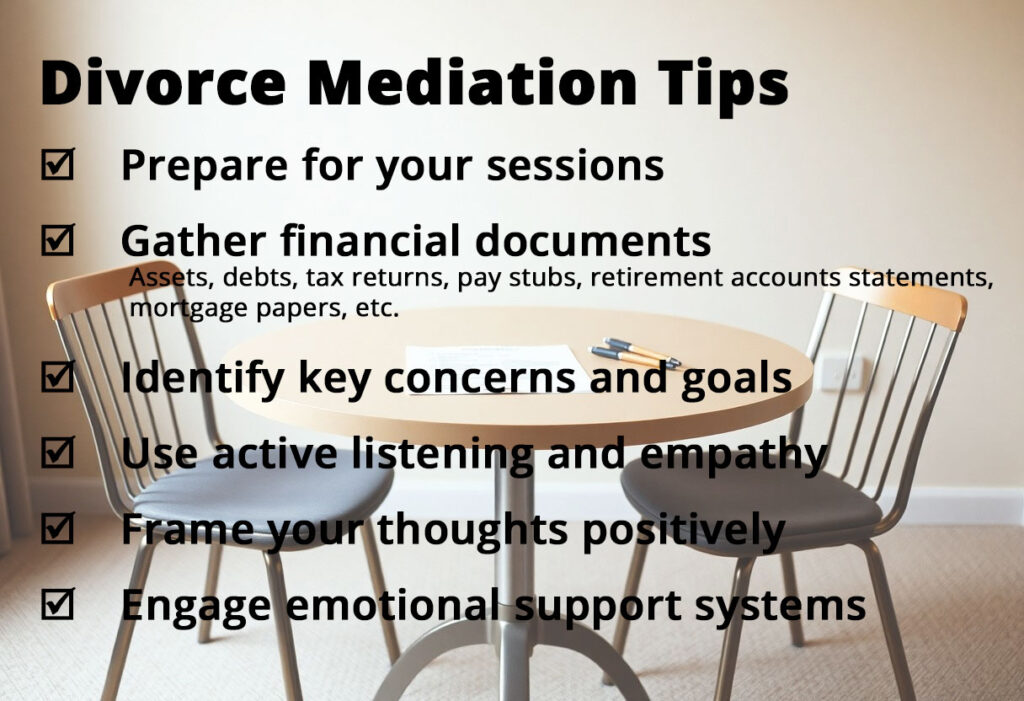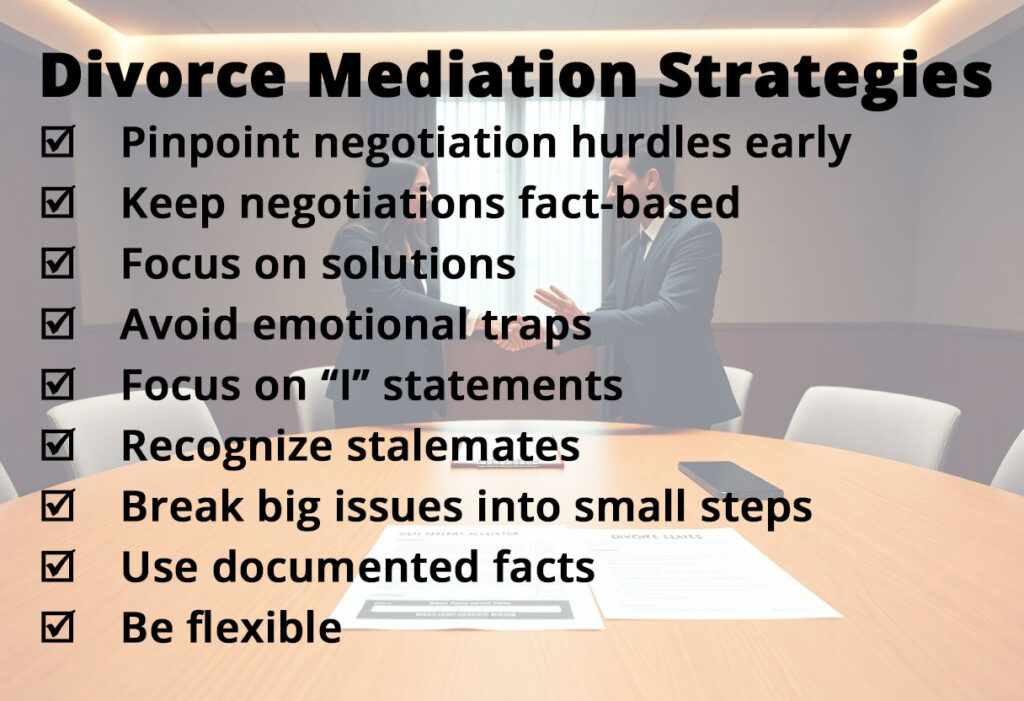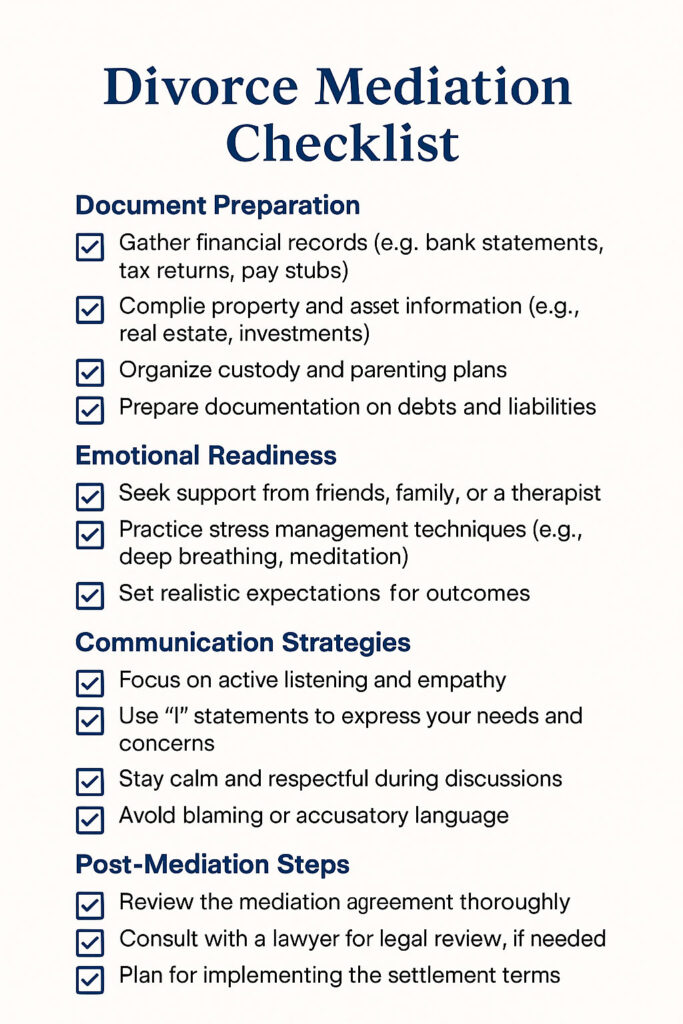Home »
Divorce Mediation Tips & Tricks & Checklist

Key Takeaways for Divorce Mediation Tips & Tricks
- Prepare thoroughly by organizing all relevant documents such as financial records, custody arrangements, and property details before mediation.
- Maintain clear and respectful communication to facilitate mutual understanding and reach agreements more effectively.
- Focus on collaborative problem-solving to create a settlement that benefits both parties and reduces emotional stress.
Just going through a divorce can feel overwhelming, but divorce mediation offers a way to find common ground outside of Nassau County Supreme Court or Suffolk County Supreme Court.
In this article, we’ve gathered practical tips and a detailed checklist to help you navigate the divorce mediation process smoothly and confidently. Whether you’re preparing for your first divorce mediation session or looking to improve communication with your spouse, this guide will equip you with tools to stay organized and focused on your goals. We want you to approach divorce mediation informed and empowered, making the experience as constructive as possible for both you and your spouse.
The Unseen Advantages of Choosing Divorce Mediation over Litigation
Divorce mediation often reveals benefits that go beyond just resolving legal disputes. Unlike courtroom battles involved in contested divorces, mediation encourages cooperation and creative solutions tailored to your unique situation. This approach fosters better communication, allowing you to maintain control over the important decisions that have to be resolved in your divorce. With divorce mediation, agreements tend to be faster, more flexible, and more durable, reducing the chances of future conflicts with your ex. Choosing divorce mediation can transform what might be a bitter struggle into a more manageable, respectful process, preserving a foundation for future interactions, especially when children are involved.
Divorce Mediation Offers Cost-Effective Solutions
Legal fees from traditional divorce litigation can easily climb into the tens of thousands. Divorce mediation, on the other hand, dramatically reduces these costs by streamlining negotiations into a few sessions rather than many meetings and court appearances with your lawyers. The less time your attorney or mediator has to spend on your case, the lower your legal fees will be. Many couples spend only a few thousand dollars, often less than a fifth of typical litigation expenses. Avoiding prolonged court battles and multiple attorney consultations means you can allocate your resources more toward your new beginning rather than mounting legal bills. In our experience, clients often appreciate how divorce mediation delivers substantial savings without sacrificing the quality or fairness of the outcome.
Divorce Mediation Has Emotional Benefits and Reduces Stress
Mediation lowers emotional strain by offering a confidential and supportive environment where you and your spouse collaborate instead of clash. The amicable setting reduces the anxiety often associated with court hearings and public scrutiny. Participants frequently report feeling more heard and respected, which helps lessen feelings of anger or resentment. This calmer atmosphere plays a critical role in promoting quicker emotional healing and smoother transitions post-divorce.
Delving deeper, divorce mediation’s ability to minimize hostility can have lasting psychological benefits for both you and your spouse. Engaging constructively in dispute resolution prevents escalation into bitter confrontations that typically characterize litigation. Studies show that couples who choose mediation experience lower levels of depression and anxiety afterward compared to those who opt for court trials. Because mediation focuses on mutual understanding and compromise, it preserves a sense of dignity and often supports ongoing communication, particularly vital when co-parenting. These emotional advantages frequently translate into healthier family dynamics long after your divorce has been finalized.

Divorce Mediation Checklist
Prepare for Your Divorce Mediation Session
Before you sit down for mediation, spend some time organizing your thoughts and materials. Being organized and having all your records available can make the entire process smoother. Arranging clear documentation, mapping out your priorities, and understanding potential compromises you are willing to make sets a constructive tone. Divorce mediation thrives on clarity, and walking in with a well-structured approach helps you focus on solutions rather than obstacles. Focus on gathering concrete information that supports your goals and anticipate areas where flexibility might be necessary to find middle ground with your spouse.
Step 1: Gathering Financial Documents
Collecting comprehensive financial records streamlines discussions and reduces surprises during divorce mediation sessions. Bank statements, tax returns from the past two years, pay stubs, investment portfolios, mortgage statements, and credit card bills all play a role in painting a clear picture of your financial landscape. Having these documents on hand enables quicker resolutions on alimony or spousal support, child support, asset division, and debt responsibilities, giving you confidence when negotiating.
Step 2: Identifying Key Concerns and Goals
Outline your primary concerns and what you hope to achieve from mediation before the session begins. Prioritizing issues like child custody arrangements, spousal support, or property division helps keep conversations focused. Balancing firm goals with areas where you’re open to compromise builds flexibility and promotes productive dialogue during your divorce mediation sessions.
Taking a detailed approach to pinpointing your goals can reveal priorities you might not have initially considered. For instance, distinguishing between short-term needs such as immediate financial support and long-term objectives like retirement benefits influences the negotiation strategy. Listing these concerns in order of importance allows you to present a clear agenda to the mediator, helping steer conversations toward mutually acceptable outcomes. Discussions centered on specifics—such as scheduling for childcare or precise asset allocations—often yield faster agreements than broad generalities.
Mastering Communication Techniques for Successful Mediation
Clear communication often makes or breaks mediation sessions. At Hornberger Verbitsky, P.C., we focus on maintaining calm tones and concise expression, ensuring emotions don’t cloud the core issues of your divorce. Techniques like paraphrasing elements from the other party’s statements help prevent misunderstandings. Incorporating pauses to gather thoughts before responding gives space for reflection and reduces reactive responses. You’ll find that blending these approaches creates an environment where collaboration feels more natural, and contentious points become manageable.
Active Listening and Empathy
Active listening means fully concentrating on what your ex-partner says without planning your response mid-conversation. We often nod or summarize their points to confirm understanding, which signals respect and can lower defensiveness. Empathy involves acknowledging their feelings even if you disagree, such as saying, “I see that this situation is really painful for you.” These behaviors encourage openness, making negotiation smoother and more productive.
Framing Your Thoughts Positively
Reframing statements to focus on shared goals or future solutions softens confrontations. Instead of saying, “You never considered my opinion,” try, “I’d like us to find options that work for both of us.” This shift moves the dialogue from blame to collaboration and increases the chances of mutual agreement in mediation.
Expanding on positive framing, we find that replacing absolute or negative words with flexible language reduces tension. For example, substituting “always” or “never” for “sometimes” or “often” prevents your partner from feeling attacked. Highlighting benefits, like co-parenting harmony or financial stability, frames negotiations around tangible outcomes. Studies show that couples who use positive framing techniques in mediation report 30 percent higher satisfaction with agreements reached. Implementing this approach regularly changes the mediation dynamic from adversarial to solution-oriented.
Navigating Common Pitfalls: Strategies for Staying on Track
Divorce mediation often hits roadblocks that, if allowed to snowball, can derail progress, but staying focused on the issues rather than personal grievances keeps negotiations productive. Pinpointing negotiation hurdles early prevents unnecessary delays and emotional flare-ups. We’ve seen mediations improve dramatically once both parties commit to addressing tangible concerns like property division or child custody without veering into blame. Keeping discussions fact-based and solution-oriented helps move disputes forward, even when tensions rise. In our experience, a clear roadmap with defined steps often serves as a reliable guide to prevent getting stuck in repetitive arguments.
Avoiding Emotional Traps
Emotional triggers often surface during divorce mediation, often derailing conversations with past grievances or blame. We encourage clients to focus on actionable solutions rather than reliving hurtful moments to avoid getting caught in these traps. Techniques like taking breaks, using “I” statements, and keeping communication respectful help maintain a constructive tone. For example, shifting “You never supported me” to “I need more clarity about financial arrangements” changes the conversation from adversarial to collaborative, which significantly increases the chances of a successful agreement.
Recognizing Stalemates and Moving Forward
Stalemates occur when you and your spouse hit an impasse, often over disagreements about assets or parenting time. Spotting these issues early allows you to employ strategies like shifting negotiation tactics, introducing objective data, or bringing in a neutral expert. We’ve found that breaking down complex issues into smaller, more manageable parts can help untangle deadlocks and renew momentum. Accepting when a particular topic needs more information or time can actually speed up the overall mediation process by preventing unnecessary gridlock.
When facing a stalemate, detailed financial reports or custody evaluations often reframe discussions in more objective terms, reducing emotional friction. I recall a case where parties deadlocked over property values until a certified appraiser’s report reset expectations. Similarly, court-ordered parenting assessments can clarify concerns and provide recommendations that ease negotiations around child custody. Flexibility in approach, willingness to revisit issues later, and sometimes pausing mediation briefly all contribute to overcoming deadlocks and preserving the cooperative atmosphere needed for resolutions.

The Ultimate Divorce Mediation Checklist: Tools for Success
Bringing the right tools to divorce mediation can dramatically influence the outcome. Gathering everything—from financial records to custody preferences — lets you approach each session with confidence and clarity. Organizing your information systematically avoids last-minute scrambles and shows commitment to resolving issues fairly. We recommend using detailed spreadsheets for asset division and a dedicated folder for all legal correspondence. These practices make collaboration smoother. Having tangible proof like bank statements or property deeds not only supports your position but also expedites negotiations. This checklist becomes your blueprint, turning complex discussions into actionable steps.
Essential Documents and Information
Collecting comprehensive financial documents such as tax returns, pay stubs, statements for retirement accounts, and mortgage papers sets a solid foundation for divorce mediation. Custody agreements or proposed parenting plans prepared in advance can help clarify your expectations. It’s helpful to include debts, liabilities, and insurance policies to get a full picture of shared responsibilities. We’ve seen how thorough documentation eliminates guesswork, accelerates settlements, and limits surprises, particularly in asset or child support discussions.
Emotional Preparation and Support Systems
Engaging a support system beforehand reduces emotional fatigue during mediation sessions. A trusted friend, counselor, or support group can offer perspective and help process sensitive feelings that arise. We encourage scheduling breaks to reflect and decompress, which prevents reactive decisions fueled by stress. Setting realistic goals and practicing calm communication strategies beforehand notably improves the negotiations’ tone and effectiveness.
Emotional readiness extends beyond just showing up calm; it means understanding triggers and having coping mechanisms in place. For example, journaling thoughts between sessions can clarify your priorities and reduce your anxiety. Some of our clients find mindfulness or breathing exercises reduce tension during stressed discussions. Additionally, notifying your support network of mediation timelines creates accountability and ensures you won’t navigate the process in isolation. We’ve found clients who proactively manage their emotional state reach mutually beneficial agreements more often and with less lingering resentment.
Divorce Mediation Tips and Checklists Smooth the Process
Understanding and using effective divorce mediation tips and a well-organized checklist can significantly ease the process for you. By staying focused, communicating openly, and preparing thoroughly, you increase the chances of a fair and amicable resolution. We encourage you to approach mediation with patience and clarity, ensuring your needs and interests are clearly presented. Using these strategies, you can navigate the challenges of divorce mediation more confidently and work toward outcomes that support your future well-being.
Contact an Experienced Long Island Divorce Mediator
In order to fully protect your rights, you should seek the help of an experienced Long Island divorce mediator. When you set up your free consultation with us, we will discuss the relevant facts and circumstances surrounding your case in order to get a better understanding of your situation. If you are considering divorce mediation, call our office today at 631-923-1910 to schedule your complimentary consultation with one of our experienced Long Island divorce mediators.

“My ex and I met with Mr. Hornberger to attempt mediation. While we were unable to successfully mediate (Mr. Hornberger tried his best to help make mediation a quick and easy process). Mr. Hornberger was able to help with the sale of our house and later purchase of my new home. He was always super responsive and made the whole process super simple. Would highly recommend!“
~Sarah Sheridan
Frequently Asked Questions About This Post
Q: What are some effective communication strategies during divorce mediation?
A: Maintaining respectful and clear communication is imperative. Practice active listening by allowing the other party to speak without interruption, and use “I” statements to express your feelings without assigning blame. Keeping a calm tone helps reduce tension and encourages cooperative dialogue.
Q: How can I prepare for a divorce mediation session?
A: Gather all relevant financial documents, such as income statements, bank accounts, debts, and property ownership papers. Make a list of key issues you want to address, including child custody, support, and asset division. Organizing this information beforehand helps facilitate a more efficient mediation process.
Q: What should be included in a divorce mediation checklist?
A: A good checklist includes items like documenting assets and liabilities, listing parenting time preferences, outlining support expectations, identifying shared responsibilities, and noting any special needs of children. It can also include preparing questions to ask the mediator and setting personal goals for the mediation outcomes.
Q: How can I handle emotional stress during divorce mediation?
A: Managing emotional stress can involve taking breaks when discussions become intense, practicing relaxation techniques such as deep breathing, and seeking support from trusted friends or a counselor outside of mediation sessions. Focusing on problem-solving rather than past conflicts can also reduce emotional strain.
Q: What role does the mediator play, and how can I make the most of their assistance?
A: The mediator acts as a neutral facilitator, helping both parties communicate effectively and explore options for settlement. To maximize their assistance, be open and honest, stay flexible with potential compromises, and follow the mediator’s guidance on negotiation techniques and conflict resolution.
GET YOUR FREE CONSULTATION TODAY Call 631-923-1910 or fill in the form below

Horberger Verbitsky, P.C. partners Robert E. Hornberger, Esq. and Christine M. Verbitsky, Esq.
At your consultation, we will:
- Conduct a Comprehensive Review of your particular situation
- Provide a Full Explanation of the Legal Issues involved in your matter
- Discuss your Goals and Objectives
- Develop a Strategic Plan to Achieve your Goals
- Answer All of Your Questions & Concerns
- Provide Advice on collecting Key Documentation and Evidence to gather to achieve your desired outcome
Your attorney will describe the many options available to determine together the right solution for you. By the end of this conversation, we’ll all understand how we can best help you to move forward.
No Cost or Obligation
There is no cost or obligation for this initial consultation. It is simply an opportunity for us to get to know each other, answer your questions and learn if Hornberger Verbitsky, P.C. is right the right law firm for you. Give us a call at 631-923-1910 or fill in the short form below for your free consultation and case evaluation.
About the Author
Robert E. Hornberger, Esq., Founding Partner, Hornberger Verbitsky, P.C.
- Over 20 years practicing matrimonial law
- Over 1,000 cases successfully resolved
- Founder and Partner of Hornberger Verbitsky, P.C.
- Experienced and compassionate Long Island Divorce Attorney, Family Law Attorney, and Divorce Mediator
- Licensed to practice law in the State of New York
- New York State Bar Association member
- Nassau County Bar Association member
- Suffolk County Bar Association member
- “Super Lawyer” Metro Rising Star
- Nominated Best of Long Island Divorce Attorney four consecutive years
- Alternative Dispute Resolution Committee Contributor
- Collaborative Law Association of New York – Former Director
- Martindale Hubbell Distinguished Designation
- America’s Most Honored Professionals – Top 5%
- Lead Counsel Rated – Divorce Law
- American Institute of Family Law Attorneys 10 Best
- International Academy of Collaborative Professionals
- Graduate of Hofstra University School of Law
- Double Bachelor’s degrees in Philosophy, Politics & Law and History from SUNY Binghamton University
- Full Robert E. Hornberger, Esq. Bio















